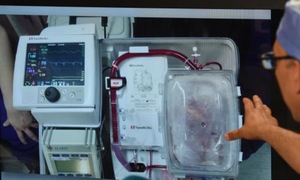
Public hospitals are facing a future funding crisis after deep federal government cuts, the Australian Medical Association has warned, boosting the state premiers’ case as they demand the prime minister, Tony Abbott, reverse reductions in health spending in last year’s budget.
The AMA’s annual public hospital report card has found public hospital beds are not keeping pace with population growth and demand, elective surgery waiting times are not improving and emergency department waiting times are improving only slightly and remain below a national target.
And the AMA’s president, Brian Owler, said the performance of hospitals would only get worse after the federal government “retreated from its responsibilities” on hospital funding, cutting $1.8bn in immediate funding over the next four years in the 2014 budget and reneging on a deal to help meet increased hospital costs in the long term, saving $57bn over the next 10 years.
“The states and territories are facing a huge ‘black hole’ in public funding after a succession of commonwealth cuts,” Owler said. “A perfect storm is building ahead of new commonwealth public hospital funding arrangements based on indexation and population growth, which will take effect from 2017-18. These new arrangements will be imposed on a system already struggling with insufficient capacity, a system that is underperforming against key benchmarks,” he said.
State premiers have been making the same case since last year’s budget and intend to demand answers from the prime minister at the Council of Australian Governments (Coag) meeting on Friday. On the same day state health ministers will be making the same case at a meeting with the federal health minister, Sussan Ley, in Sydney.
The South Australian premier, Jay Weatherill, told Guardian Australia on Wednesday the commonwealth should raise more revenue by cutting superannuation tax concessions, cracking down on multinational tax avoidance, imposing a tax “floor” on high net worth individuals or extending the GST to online purchases.
The federal government is looking at some of those ideas in preparations for the 2015 budget in May, but with a view to paying down the deficit or paying for other spending priorities – not in order to undo cuts it made in last year’s budget.
The commonwealth had hoped the looming crisis in hospital funding might convince the states to agree to an increase in the goods and services tax, but the states have not, and according to Weatherill, it is now up to the commonwealth to sort out the mess.
“It was their funding cut to hospitals and they need to help us find a solution … the first four years of these spending cuts are difficult but after that it becomes entirely impossible,” Weatherill said.
The New South Wales premier, Mike Baird, is also demanding the commonwealth reverse the cuts.
“What happened last federal budget is not sustainable,” he said before the recent NSW poll. “The commonwealth and the federal government said, ‘We are going to allocate a large part of the future growth in health costs from ourselves to the state governments … that is not sustainable.
“The states do not have the capacity to meet those health costs on their own. The commonwealth has a critical role to play. It’s not sustainable, to pass that health cost, which is the biggest cost to every state budget, down – that is the number one issue, we need to ensure the federal government deals with.”
According to the AMA report, to be released Thursday, the ratio of bed numbers to the general population has not improved since 2009 and has declined as a proportion of over 65-year olds in the population, elective surgery waiting times have flatlined at 36 days and only 70% of urgent patients are seen within agreed emergency department waiting times – a small improvement but below national benchmarks.
The $57bn in long-term commonwealth funding reductions means NSW will lose almost $16bn, Victoria $12bn, Queensland $10bn, Western Australia $5.7bn, South Australia $3.5bn, Tasmania and the ACT around $1bn and Northern Territory about $600mn. The cuts were included in the commonwealth’s long-term spending projections in the intergenerational report, which the Abbott government uses to claim it has “halved” projected deficits compared to what they would have been under Labor policies.
Friday’s Coag meeting will also discuss the feud between the states over the divvying up of GST revenue. The commonwealth is expressing sympathy for Western Australia’s demands that it get a bigger share than that allocated by the independent Commonwealth Grants Commission, but also insisting that the states work out a solution. No other state supports Western Australia’s position.
